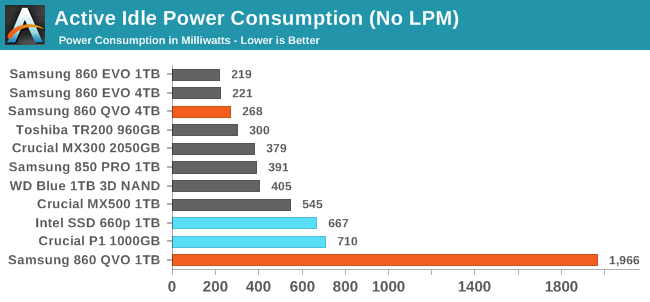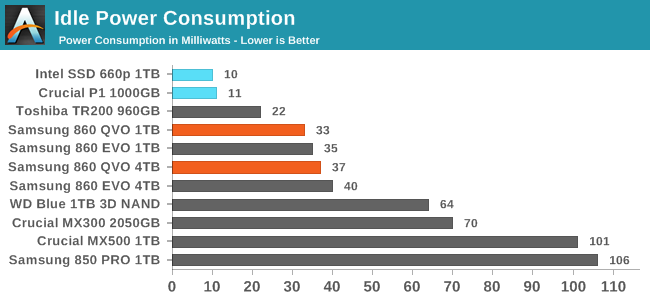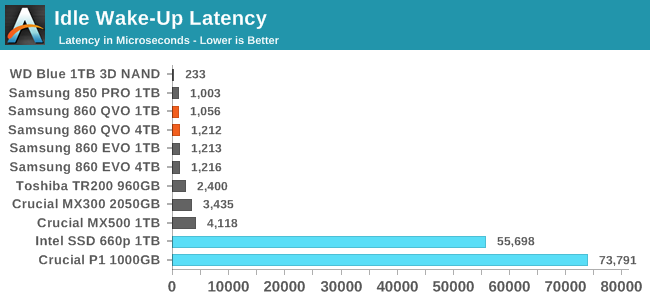The Samsung 860 QVO (1TB, 4TB) SSD Review: First Consumer SATA QLC
by Billy Tallis on November 27, 2018 11:20 AM ESTIdle Power Measurement
SATA SSDs are tested with SATA link power management disabled to measure their active idle power draw, and with it enabled for the deeper idle power consumption score and the idle wake-up latency test. Our testbed, like any ordinary desktop system, cannot trigger the deepest DevSleep idle state.
Idle power management for NVMe SSDs is far more complicated than for SATA SSDs. NVMe SSDs can support several different idle power states, and through the Autonomous Power State Transition (APST) feature the operating system can set a drive's policy for when to drop down to a lower power state. There is typically a tradeoff in that lower-power states take longer to enter and wake up from, so the choice about what power states to use may differ for desktop and notebooks.
We report two idle power measurements. Active idle is representative of a typical desktop, where none of the advanced PCIe link or NVMe power saving features are enabled and the drive is immediately ready to process new commands. The idle power consumption metric is measured with PCIe Active State Power Management L1.2 state enabled and NVMe APST enabled if supported.


It appears that the 1TB Samsung 860 QVO was still busy with background processing several minutes after the test data was written to the drive, so our automated idle power measurement caught it still drawing 2W. The 4TB was much quicker to flush its SLC cache and turned in a respectable active idle power consumption score. Both drives have good idle power consumption when put into the slumber state, though we've measured slightly higher than the official spec of 30mW.

The wake-up latency for the 860 QVO is the same as their other SATA SSDs, hovering around a reasonable 1.2 ms. It's not the best that can be achieved over SATA, but it's nothing to complain about.










109 Comments
View All Comments
Morawka - Wednesday, November 28, 2018 - link
I just had 2 Samsung QLC 3 bit drives die this year alone. They were less than 1.5 year old. I'm never buying Samsung's EVO line again. It will be Pro from here on out. 4 bit drives will fail even faster.Makaveli - Wednesday, November 28, 2018 - link
Which model evo's were those Morawka?And how many writes did they see? what kind of environment did you have them in?
stephenbrooks - Wednesday, November 28, 2018 - link
I was starting to get excited about 2TB for $300 but then I looked up 2TB HDDs and they're about $60. Still a huge price differential especially as I usually want at least one extra drive for nightly backups, although perhaps the backup drive could be the HDD?Lolimaster - Thursday, November 29, 2018 - link
Even with the right capacities for a QLC price is similar or worse than current TLC.Samsunf 860 EVO 1TB $127
For QLC to make sense it should HALF of a TLC else is a ripoff.
s.yu - Friday, November 30, 2018 - link
What's the point of trying to pronounce it? It's just Q-V-O!araczynski - Friday, November 30, 2018 - link
so basically next black friday these should be half price and the 4tb might be worthy of consideration as a Steam drive.thomas-hrb - Friday, November 30, 2018 - link
$149.99 launch price is encouraging even if it is currently more than the 860evo. The 860evo launched for over $300 (closer to $330) and is now $139. If the qvo follows this pattern we can look forward to sub $65 for the 1tb qvo and maybe even $250 for 4tb.Ankou - Friday, November 30, 2018 - link
I think these QLC drives are a bad idea especially in the way they're being marketed. I'm not even talking about performance, the speed reduction I could live with. However, they're orders of magnitude worse in P/E cycles, retention, and endurance. These manufacturers know this and they're preying on the lack of education and focusing on price. Even so far as advertising these drives (this one in particular) as using 4 bit MLC memory (which 4 bit MLC is *always* QLC) implying that it is on safer MLC memory:https://news.samsung.com/global/samsung-electronic...
That is completely a scummy marketing/PR way of doing business.
s.yu - Saturday, December 1, 2018 - link
The fundamental issue is that 2-bit MLC should have been accurately named DLC in the first place, it's not like somebody's gonna mix that up with downloadable content.0ldman79 - Saturday, December 15, 2018 - link
Could we get some numbers from some mechanical drives, WD or Seagate 1TB or 2TB, in comparison to the slower QLC drives?I'd like to see how they hold up against the QLC in random and sustained reads/writes. The latency might be the deciding factor even though I've got some mechanical drives that can beat them on sustained reads/writes.